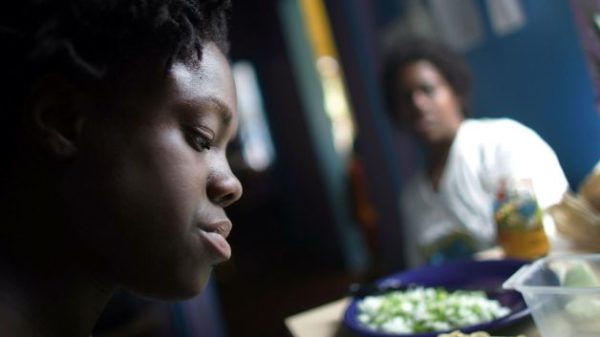
Recently, The Chicago Tribune reported that researchers from Northwestern University had found interesting results as they studied low-income African-American women living in the Chicago community of Oakland. The researchers, who recruited 72 women with depression symptoms from the high-crime Southside neighborhood for their 2016 study, found that nearly 30 percent of the women had PTSD, and 7 percent exhibited strong symptoms of the disorder. If one-third of African-American women in some communities may be at risk, PTSD is an issue that should concern the African-American community.
Why are African-American women suffering from PTSD? What can be done to help them?
According to the National Institutes of Mental Health, “PTSD is a disorder that develops in some people who have experienced a shocking, scary, or dangerous event.” The NIMH notes that to be diagnosed with PTSD after a traumatic event, a person must display one or more symptoms from each of the following categories: re-experiencing (e.g., flashbacks), avoidance (e.g., staying away from places associated with the trauma), reactivity (e.g., being easily startled), and changes in cognition or mood (e.g., difficulty remembering the trauma, etc.).
Many traumatic events can provoke PTSD. According to the Mayo Clinic, events that can trigger PTSD include military combat, childhood physical abuse, sexual assault (rape), physical assault, being threatened with a weapon, car accidents, fires, natural disasters, violent crimes (muggings, robberies, etc.), and other “extreme or life-threatening events.”
However, the NIMH cautions that not every person who is exposed to a traumatic event will develop PTSD. There are risk factors that make a person more likely to develop the disorder. One of the risk factors is being a woman, as women are more likely to develop PTSD than men. The National Center for PTSD found that while women have lower exposure to traumatic life events as compared to men, because women are more likely to experience sexual assault and childhood sexual abuse, they may be more likely to experience PTSD. Additionally, the National Center found that women may be at higher risk because they are more likely than men to experience trauma within trusted relationships or to suffer chronic violence. A trauma like domestic violence during a marriage or romantic relationship would meet both criteria.
For African-American women, gender and race intersect to make them uniquely vulnerable to PTSD. Dr. Monnica T. Williams, author, licensed clinical psychologist, and associate professor at the University of Connecticut’s Psychological Sciences Department, spoke to Atlanta Black Star about PTSD in African-American women. “African American women experience the same traumas as other women, but at higher rates.”
Dr. Williams is correct. According to research by Darkness to Light, a nonprofit dedicated to ending child sexual abuse, “African-American children have almost twice the risk of sexual abuse than white children.” According to the National Center for Victims of Crime, girls are four times more likely to be sexually assaulted than boys. Therefore, Black girls are at risk for sexual assault. As African-American women grow into adulthood, their risk does not decrease. According to the Maryland Coalition Against Sexual Assault, “African American girls and women 12 years old and older experienced higher rates of rape and sexual assault than white, Asian, and Latina girls and women from 2005-2010.” The Coalition also found that 60 percent of Black women have experienced abusive sexual conduct by age 18 and 40 percent of sex trafficking survivors in the United States are African-American. Thus, over their lifetimes, there is a significant likelihood that African-American women will suffer sexual trauma. The research indicates that African-American women who are sexually assaulted are four times more likely to experience PTSD than those who are not.
Domestic violence (intimate partner violence) is also associated with PTSD. According to Dr. Williams, “Domestic violence is traumatic, and being victimized more than once increases your risk of PTSD.” Although women of all races and economic backgrounds can experience domestic violence, there is some evidence that African-American women may be at higher risk. A limited study from the University of Texas found that among nearly 2,000 couples, domestic violence was nearly twice as prevalent in the African-American families. Statistics from the Department of Justice show that African-American women are more likely than white women to experience domestic violence from the ages of 20-24, but not at other ages. Either way, African-American either face domestic violence at slightly higher or significantly higher rates than other women. Significantly, research from the Journal of Women’s Health found that low-income African American women who had experienced domestic violence not only had PTSD, but also had “strikingly high levels of PTSD symptoms.”
Yet another issue must be considered: racism. Many researchers have made note of the connection between racism and trauma. A study from the University of Michigan stated, “Blacks are more likely to experience race-related stressors and oppression that can lead to increased feelings of victimization, which may also increase the risk for PTSD.” A Harvard study also observed that, “perceived discrimination, race-related verbal assault and racial stigmatization have been linked to PTSD, and may partially account for the higher conditional risk of PTSD among Blacks.”
When asked how racism may contribute to PTSD in African-American women, Dr. Williams was careful to explain that dealing with racism in daily life is different than other traumas. She stated, “PTSD is typically thought of as a response to a specific trauma. However, it is now recognized that repeatedly being exposed to traumatic materials can result in a formal diagnosis of PTSD. Although a single life-threatening event motivated by racism qualifies as a trauma, most expressions of racism tend to be less extreme and more frequent than events typically considered traumatic. Thus, most cases of racial trauma are the result of repeated events, not unlike traumatization resulting from ongoing sexual harassment or bullying. In these cases, chronic interpersonal events of a distressing nature occur with enough frequency that the victim begins to worry about future distressing events, resulting in hypervigilance, avoidance, and anxiety — all core symptoms of PTSD. Trauma is cumulative — the more traumas people experience the more traumatized they become — so even small acts of racism contribute to the traumatic load. Black people experience more racism than any other group, so it makes sense that we see more traumatization as a result.”
In other words, over time, the repeated experience of dealing with the trauma of racism can take a psychological toll on African-American women. Indeed, researchers from Boston University found that African-Americans who reported experiencing racism had the highest rates of PTSD in the non-white racial groups studied.
PTSD can affect many areas of a patient’s health. Although it is a psychological condition, it can have other impacts as well. Recent research has shown that African-American women with PTSD are more likely to experience obesity, disordered eating, and even chronic illnesses such as heart disease and diabetes. Indeed, researchers from Harvard found that PTSD was associated with a 90 percent higher risk for type 2 diabetes among African-American study participants. For these reasons, PTSD should not be taken lightly.
Though PTSD is serious, some Black women may be cautious about seeking help from mental health professionals, particularly if those professionals are white. In 2001, the Surgeon General conducted a report on mental health and found that for nonwhites, “The foremost barriers include the cost of care, societal stigma, and the fragmented organization of services. Additional barriers include clinicians’ lack of awareness of cultural issues, bias, or inability to speak the client’s language, and the client’s fear and mistrust of treatment.”
Dr. Williams further explained, “The biggest problem is lack of meaningful diversity training among therapists. Until recently, clinical psychologists didn’t get much diversity training in their graduate programs, and so they never learned how to work with people of color. Now the APA is trying to crack down on this and make sure that the students are getting the training they need, but graduate programs still find many of ways to get around the is requirement, usually because they don’t have faculty qualified to teach diversity issues to students.”
Despite barriers to seeking counseling, the good news is that if the patient can overcome those obstacles, Black women are excellent candidates for many of the most effective PTSD treatments. Researchers have found that African-American women improve greatly after using methods such as cognitive behavioral therapy, exposure therapy, and mindfulness-based stress reduction. Moreover, Dr. Williams noted that she and her colleagues are pioneering the use of methylenedioxymethamphetamine (MDMA, also known as “ecstasy” or “molly”) in nonwhite populations. She stated, “The FDA recently designated MDMA-assisted psychotherapy for PTSD breakthrough treatment, and we want to make sure that it is effective and available for people of color.”
Professionals at the American Psychological Association suggest these steps, among others, to provide help to a loved one who might be suffering from PTSD:
- DO NOT force the person to discuss the traumatic event.
- DO NOT offer advice.
- DO NOT try to “talk them out of it” or tell them to “look on the bright side.”
- DO offer support without judgment.
- DO listen.
- DO give the person “time, space, and patience.”
- DO help them find support, if asked.
- DO encourage them to seek additional professional help, especially if the person has physical symptoms of stress, sleep disturbances, emotional upset, or begins abusing drugs or alcohol to cope.
African-American women face a number of public and private traumas — some directly connected to our Blackness and femaleness, some not. Although Black women are often viewed as the caretakers of Black communities, Black women can care for no one if they do not first take care of themselves, and that includes maintaining their mental health. As Dr. Williams stated, “No can or should be strong all the time.”


